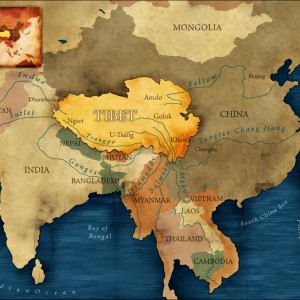Geoffrey Dabelko: Talking water and opportunities for environmental peacemaking
Dr. Geoffrey D. Dabelko is director of the Environmental Change and Security Project at the Woodrow Wilson International Center for Scholars in Washington, D.C. Dabelko discusses water, peacemaking and challenges in China and the Tibetan Plateau.
This is a rush transcript with excerpts provided for convenience; verbatim accuracy is not guaranteed.
J. Carl Ganter – Circle of Blue: What role does water play in water peacemaking or environmental conflict?
Geoff Dabelko: We typically think of water and conflict, and in many ways it makes sense. Environmental management is in many respects is conflict management, it’s just that it often doesn’t become violent. In the case of water, we obviously have lots of tension around water, but don’t see the evidence for all the water wars that so many politicians and so many newspaper headlines scream about. What we often see is that while it is and perhaps it is such a critical resource between societies, between groups, between communities, between countries, that we find ways to at least cooperate and not make that the focus of conflict. For example, between the Jordanians and the Israelis, the bureaucrats that had to manage this resource came together literally at a picnic table at the boarder for what became known as the picnic table talks, to jointly manage [water] when their two countries were formally at war. Similarly, in India and Pakistan on the Indus rivers, these are dialigoues that continue to go on. Where if its not formal and active and proactive cooperation, there’s at least a willingness to keep this issue off from the table and formally fighting over the conflict.
JCG: Can you put Darfur in context with water conflict?
Geoff Dabelko: I think it is important for us to remember in all conflicts there are many causes. Some are underlying and foundational, and some are the proximate and most obvious. And in many times, you have conflict entrepreneurs exploiting some of these underlying causes for their own purposes. So in the case of Darfur, you absolutely must start with the conflict entrepreneurs in Khartoum who are pitting one group that makes its living as pastoralists and one that makes it as agriculture. So it happened to coincide with ethnic groups and different backgrounds. And they’re using that for their own purposes in terms of generating conflict between those two groups. There have always be conflicts between pastoralists and agriculturalists in what is now Sudan and across Sub-Saharan Africa. What is now severly testing the conlfict resolution mechanisms are, on the one hand, those folks who are using this and exploiting these differences and really perpetrating a genocide in the region. The other is that they are facing literally decades of intense drought periods, a combination of growth of people, but also cattle — tremendous growth in the last fifty years in the number of cattle that this arid area. And more arid in fact, including even losing land area in desertification is expect to sustain. One should start the story of Darfur about Janjaweed and the regime in Khartoum is perpetrating this genocide. One can’t tell the story without understanding these larger underlying environmental conditions that are integrally related to water availability.
JCG: Talk about the geopolitical positioning of the Tibetan plateau…
Geoff Dabelko: Well there are many countries — well over a billion if not close to two billion people — who are dependent this water coming originating in the Tibetan Plateau. And by definition that makes it high politics and critically important in a political strategic sense, but also the every day livelihoods of literally billions of people who … are living at the margins. So this is a critical input into their daily lives. One that has challenges in terms of quantity and timing, in terms of flooding particularly being a terrible problem there. And issues of upland deforestation having very negative effects across borders for populations downstream. Also of course, quality… however you count it, two to five million people dying from dirty water and associated diseases each year. This is high politics for those who are having to depend on those water sources. So it’s both high politics at the individual level and its high politics between the countries because of the inner dependencies around the water, so much of which originates in the Tibetan plateau.
JCG: How does China’s history of water engineers and hydrologists being in high political positions play into their future water management plans?
Geoff Dabelko: Well, water in China, like in all countries, is critical to development. And with economic growth being the premier goal of the government… then that has implications both for China itself and for its neighbors. Engineering and the natural and physical sciences has a long tradition, and many, many distinguished Chinese scientists and engineers. It also so happens that in that country that the engineers and scientists are often very active politically as well. And so… the senior leadership in China has often been drawn from this disciniplary background. In China and also in India where most of the world remain large dams are still being built, you have a political leadership that understands how to do it, that gains prestige and power from large projects such as dam-building. And they see the need from an economic perspective. So whether it’s for developing energy resources, which is a tremendous enabler but also constrainer on their economic growth goal, or trying to control flooding or the prestige factor of these large dams. It’s something that comes together to be an enabling environment for these large scale projects. Now much of the world has moved away from large scale dams. In part because most of the opportunities to build them have been used. Also because the social costs associated with them. And health costs associated with large dams suggest that, in many cases, the costs might out weigh the benefits; or at least there are some very specific tradeoffs. In China that set of tradeoffs hasn’t weighted as heavy on the decision makers, so you still see large dams being built. I think we are in a position to see some challenges with downstream countries from China. Since so much of the world’s rivers, in that part of the world anyway, originate in China, they obviously have big downstream impacts. What will be critical will be having avenues and institutions to manage water across boarders and that has not always been easy. There are certainly successes. If we’re looking out into the future as to what’s going to be a way that water presents geo-stratigic challenges in Asia, it will be around trans-boundary water cooperation, with much of that water originating in the rising China.
Geoff Dabelko: I think water is seen as a strategic asset for China wherever it occurs in China, because so much of the water for China and the region originates in Tibet — it adds an additional level of importance and political sensitivity and context that does not get the attention it deserves. In part, from an optimistic spin, because we’ve even seen evidence in other parts of the world in highly contested areas that find ways to not just successfully manage water without coming to blows, but to actually use dialogue around water as a lifeline for dialogue when things are bad in other issues areas. And so, one might try to pursue proactively opportunities for dialogue between groups that are having a hard time agreeing in other issue areas. One sees that in other parts of the world and they are perhaps models that we can use as we try to move beyond the heated rhetoric behind the headlines — and try to start walking back to at least dialogue perhaps in hopes of providing some avenues for more cooperation in a more peaceful setting.
JCG: How do you see climate change and the possibilities of reduced water flow affecting this region?
Geoff Dabelko: Climate change is a real wild card when it comes to water. It is in many respects the biggest challenge to the notion that we don’t fight wars over water in the sense will the future look like the past. We haven’t done it in the past, but that doesn’t necessarily mean that we won’t in the future. And in the part the real non-linear trajectories that are a good possibility because of climate change in the area of water, raise real concerns. And so it could severely test our institutional ability to manage water across boarders. And will present us with some realities that we haven’t had to face before, most importantly at a pass — at a rate of change — that we haven’t had before. So dry places in the world that have dry for a long time, while we might just rely on water per capita, where it’s most scare is where we’d most likely see conflicts. Well that’s not the case, it’s where there is the most rapid change. So we don’t have ways to adopt politically, socially, economically to that change where we so the most disruption. So part of what is so challenging about climate change is the rapid rate of change that’s expect, in terms of precipitation patters, in terms of water availability from glacial melt that really posses some fundamental challenges to whether the future will look like the past.
JCG: Are we alone looking at the map and seeing potentials for hot-zones?
Geoff Dabelko: I think water is a tremendous challenge because it is so integral to different part of our lives in ways that we have taken for granted. That doesn’t necessarily become explicit in framing an issue as issue of water itself. Well, of course, now with food security, food is all about water. So is agriculture. Talking about industry, we have big parts of China where the water’s not even in a high enough quality for industrial purposes, let alone household and drinking purposes. So it’s a constraint on industry. Certainly, it’s a constraint vis-a-vis desertification and falling water tables, and the prospects for economic growth and human settlements in some sort of sustainable fashion in big parts of the world. And so, I think it is by being so ubiquitous it also doesn’t necessarily allow us to see it for the crisis that can be right there, because it is so integral. It does also then lead to a notion where one throws ups one’s hands because it is so complex and interlinked and difficult to tackle. We ignore it at our peril and, to me, it suggests that in a region such as Asia, it behooves us now to invest in developing institutions for finding ways to cooperate around water, particularly under situations of great stress and great change. Because once those stresses come, it will be in a crisis mode and reaction rather than proactive anticipation and trying to manage it in ways that allow us to try to adapt.
JCG: And these are areas with long histories of conflict…
Geoff Dabelko: Indeed, these are regions that don’t need another reason to fight. And hopefully water won’t offer that, hopefully it will offer exactly the opposite: a bridge of common interdependency that requires cooperation. And perhaps even levels of playing field that might in other areas be more unequal and forces some of the more powerful countries to come to the table and find ways to cooperate because of the interdependence. There are no guarantees in that regard, but I think what we are guaranteed to see is water rising in importance, going from management issue that may be assigned just to technocrats, to one that our highest levels of government will see as critical, front-line, top-priority issues.
JCG: Would it be politically possible for China to take more control of the (Tibetan Plateau’s) water?
Geoff Dabelko: I think because they are upstream and often economically and politically hegemonic, the most powerful in the region, there are precious few constraints on behavior that may be present in other parts of the world. I think there will be in some ways pressures to control excesses that come from within China, from within the populous. So you see water in some sense being a high-politics issue in China now, from it being the source of political protests against factories that are being sited in areas that then produce waste in the water that makes the population sick, to illegal land takings by those same factories. And so the social unrest that China has in recent years faced from spontaneous or at least somewhat surprising protests when coupled with technology of SMS and cell phones. Suddenly 10,000 people show up the next day and the state doesn’t realize they are about to come protest the plant. That is going to hopefully find ways to put brakes on some of the worst excesses around particularly population and water. Also perhaps dams and relocations of people. Certainly, it cannot be relied upon to solve cross-boundary issues. But nevertheless, it maybe a brake on the sort of unregulated exploitation of water that’s going to have both negative quality and quantity implications.
JCG: It would be interesting if the Dalai Lama brought up water in the possible upcoming meeting.
Geoff Dabelko: Yes, they have a full agenda, let’s just say. And hopefully water is a point that both sides of that conflict see is important and can be used as a bridge rather than a point of division.
Circle of Blue provides relevant, reliable, and actionable on-the-ground information about the world’s resource crises.







Leave a Reply
Want to join the discussion?Feel free to contribute!